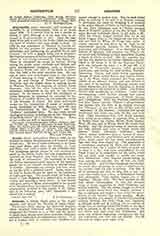

Argyropulos, JOHN, humanist, and translator of Aristotle, b. at Constantinople, 1416; d. at Rome about 1486. It is certain that he was a teacher at Padua in 1434, although it is not clear why he returned to Constantinople in 1441. After the conquest of his native city by the Turks (1453) he joined the band of scholars who took refuge in Italy. In 1456 he was summoned to Florence by Cosimo de’ Medici for the purpose of teaching (Aristotelian) philosophy and instructing the youthful Pietro and Lorenzo. In 1471 a plague broke out in Florence: this was the occasion of his leaving Florence for Rome, where he was kindly received by Pope Sixtus IV. There he continued his career as teacher, having among his pupils many cardinals and bishops and some distinguished foreigners, such as Reuchlin. He died at Rome; the year of his death is uncertain, but 1486 is the most probable date. He was one of those who contributed most to the revival of Greek learning in Italy. After Manuel Chrysoloras, he and George of Trebizond and George Gemistius had the largest share in making known to Western Europe the treasures of ancient Greek literature. Like all the other humanists, he was somewhat intemperate in his zeal for his chosen subject. In his desire to extol the excellence of Greek literature, he expressed his contempt for the literature of ancient Rome; he was especially severe in his criticism of Cicero. His most serviceable works are his translations of many of Aristotle‘s works (published by Aldo Manucci, 1518-20) and his Commentaries on the “Ethics” and the “Politics” (published 1541). He also wrote several theological treatises, including one on the “Procession of the Holy Ghost” (P.G., CI.VIII, 991 sqq.). Many of his works are still in manuscript.
WILLIAM TURNER

